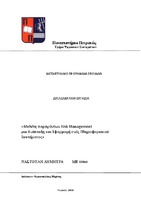Μελέτη παραγόντων risk management για ανάπτυξη και εφαρμογή ενός πληροφοριακού συστήματος

Προβολή/
Θεματική επικεφαλίδα
Enterprise Resource Planning (ERP) ; Διαχείριση κινδύνου -- Πληροφοριακά συστήματαΛέξεις κλειδιά
Ασφάλεια πληροφοριακών συστημάτωνΠερίληψη
Η πολυπλοκότητα της σύγχρονης αλυσίδας παραγωγής και διακίνησης προϊόντων, σε συνδυασμό με την ανάγκη για τεκμηριωμένη λήψη επιχειρηματικών αποφάσεων δημιουργούν την ανάγκη για ολοκληρωμένη διαχείριση των πόρων μιας επιχείρησης και της ροής πληροφοριών. Επίσης με την αύξηση του επιπέδου customer service προκύπτει μια σημαντική τάση για διαφοροποίηση προϊόντων και υπηρεσιών ανάλογα με τις ανάγκες του κάθε πελάτη. Ο μόνος ίσως τρόπος αποτελεσματικής διαχείρισης και κάλυψης των ανωτέρω απαιτήσεων επιτυγχάνεται με τη χρήση σύγχρονων πληροφοριακών συστημάτων διαχείρισης επιχειρησιακών πόρων, γνωστών και ως Enterprise Resource Planning (E.R.P.).
Τα πληροφοριακά αυτά συστήματα είναι ολοκληρωμένες επιχειρηματικές λύσεις, οι οποίες καλύπτουν πλήρως όλα το φάσμα των επιχειρηματικών δραστηριοτήτων μιας εταιρίας (παραγωγική, εμπορική, υπηρεσίες, κ.λπ.) σε ένα ενιαίο σύστημα.
Η ανάπτυξη που επιτεύχθηκε στις τεχνολογίες πληροφορικής τα τελευταία χρόνια κατέστησε σταδιακά εφικτή τη χρήση συστημάτων E.R.P. όχι μόνο σε μεγάλους οργανισμούς αλλά και σε μικρομεσαίους. Δεν θα ήταν υπερβολή να αναφερθεί ότι ''ελαφρά συστήματα E.R.P '' μπορούν να χρησιμοποιήσουν ακόμα και επιχειρήσεις με μόλις πέντε άτομα στο ενεργητικό τους, αν και γίνεται αντιληπτό ότι το όφελος της ολοκλήρωσης σε τέτοιες περιπτώσεις είναι μικρότερο απ' ότι σε πολύπλοκα οργανωτικά σχήματα όπου το πρόβλημα της συνεννόησης και της συνεργασίας μεταξύ των διαφορετικών οργανωτικών μονάδων είναι αναπόφευκτο.
Στην παρούσα διπλωματική εργασία λοιπόν, θα πραγματοποιηθεί μελέτη παραγόντων Διαχείρισης Κινδύνου (Risk Management) για την ανάπτυξη και εφαρμογή ενός Συστήματος Διαχείρισης Επιχειρησιακών Πόρων (ERP), και θα προσδιοριστεί πώς αυτό μπορεί να βοηθήσει στην εφαρμογή διαδικασιών εντός της επιχείρησης, με απώτερο σκοπό τη πρόληψη ατυχών και απευκταίων συμβάντων, κάτι που θα επηρεάσει αρνητικά την αξιοπιστία της επιχείρησης και την ικανοποίηση των πελατών.
Η συγκεκριμένη έρευνα χωρίζεται σε τρεις ενότητες.
Στην πρώτη ενότητα αναλύεται η βιβλιογραφία και πιο συγκεκριμένα οι έννοιες του έργου, του κινδύνου και της διαχείρισης κινδύνων. Επίσης, αναλύεται ο κύκλος ζωής της διαχείρισης κινδύνων, δηλαδή τα στάδια του καθορισμού του πλαισίου, του προσδιορισμού, της ανάλυσης, της αξιολόγησης, της αντιμετώπισης, του ελέγχου και παρακολούθησης, καθώς και των επικοινωνιών και διαβουλεύσεων. Τέλος αναφέρονται κάποια γενικά στοιχεία του πληροφοριακού συστήματος ERP.
Στην δεύτερη ενότητα αναλύεται η διαδικασία διαχείρισης κινδύνων του συστήματος ERP, λαμβάνοντας υπ' όψιν τα προβλήματα που προέκυψαν κατά τη διάρκεια της λειτουργίας του. Πιο συγκεκριμένα, προσδιορίζονται κάποιοι κίνδυνοι του συστήματος, αναλύονται, αξιολογούνται, βρίσκονται τα σχέδια αντιμετώπισής τους, δηλώνεται η παρακολούθηση και η κατάστασή τους και δημιουργούνται τα φύλλα κινδύνων και η συγκεντρωτική αναφορά τους.
Στην τρίτη ενότητα αναφέρονται τα συμπεράσματα της έρευνας τα οποία δείχνουν ότι η διαδικασία διαχείρισης κινδύνων είναι απαραίτητη στους οργανισμούς και ότι πιθανή έλλειψή της μπορεί να προκαλέσει από μικρά μέχρι πολύ μεγάλα προβλήματα.


